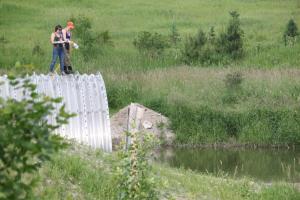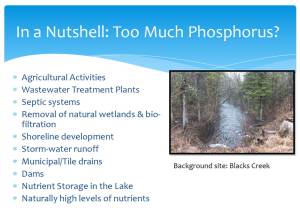Applied Research Blog: Pembroke
 Summer into fall – Here’s what we’ve been up to…
Summer into fall – Here’s what we’ve been up to…
The summer has long come to an end, but the WAMQI initiative is still going strong as we venture deeper into the cool fall months.
Throughout the summer, Tanner Roderick and Allison Rosien, our co-op student Field/Lab Technicians, conducted quantitative assessments of the watershed (sampling and hydrology). MOE graciously analyzed the samples, and one of our partners, the Muskrat Watershed Council, offered an informative public engagement event to inform stakeholders about our work; this was an opportunity to share and exchange information. We even parked our solar powered mobile science unit in the town of Cobden to showcase our sampling equipment and demonstrate certain sampling procedures. It goes without saying that the summer proved to be very successful on many fronts, from gathering data about the watershed to making first contact with stakeholders.
For fall 2014, we continue to sample all 28 sites. Additionally, 3rd level students of the Environmental Technician Diploma program at Algonquin College in the Ottawa Valley (ACOV) are working on community-based applied research projects, all directly related to the Muskrat watershed WAMQI initiative. These projects span across two courses: Land and Water Stewardship and Environmental Issues. Projects range from riparian zone plant and fauna inventories, building a Bioswale at the Shaw Woods Outdoor Education Centre (Snake River), lake-bottom sediment sampling at Muskrat Lake, determining nutrient “hot spots” along the Snake River, investigating a bridge washout at Biederman’s Creek, data interpretation, and outreach/website design. E-tech students have experienced, and continue to experience, high quality applied education and training by working on community-based research projects such as those delivered through WAMQI.
 On the community front, October 9 was the Muskrat Watershed Council public engagement event titled “Science Night”. Here we released some of the data interpreted by students and field experts. Sarah Hall, Environmental Technician Program Coordinator and full-time faculty member at ACOV, was the keynote speaker, conveying to stakeholders some of the data and information in a manner that was accessible and easy to understand. At this point, a lot of the data is still being interpreted; it will take more than one sampling season to determine what is happening on the watershed. Nevertheless, events like Science Night create opportunities to inform, share, and network, ultimately strengthening the fibres of our endeavours.
On the community front, October 9 was the Muskrat Watershed Council public engagement event titled “Science Night”. Here we released some of the data interpreted by students and field experts. Sarah Hall, Environmental Technician Program Coordinator and full-time faculty member at ACOV, was the keynote speaker, conveying to stakeholders some of the data and information in a manner that was accessible and easy to understand. At this point, a lot of the data is still being interpreted; it will take more than one sampling season to determine what is happening on the watershed. Nevertheless, events like Science Night create opportunities to inform, share, and network, ultimately strengthening the fibres of our endeavours.
Stay tuned for December when we look to publish our next blog. Until then, protect your watersheds!
Julie Sylvestre
Applied Research Coordinator, Muskrat Watershed Project
sylvesj@algonquincollege.com